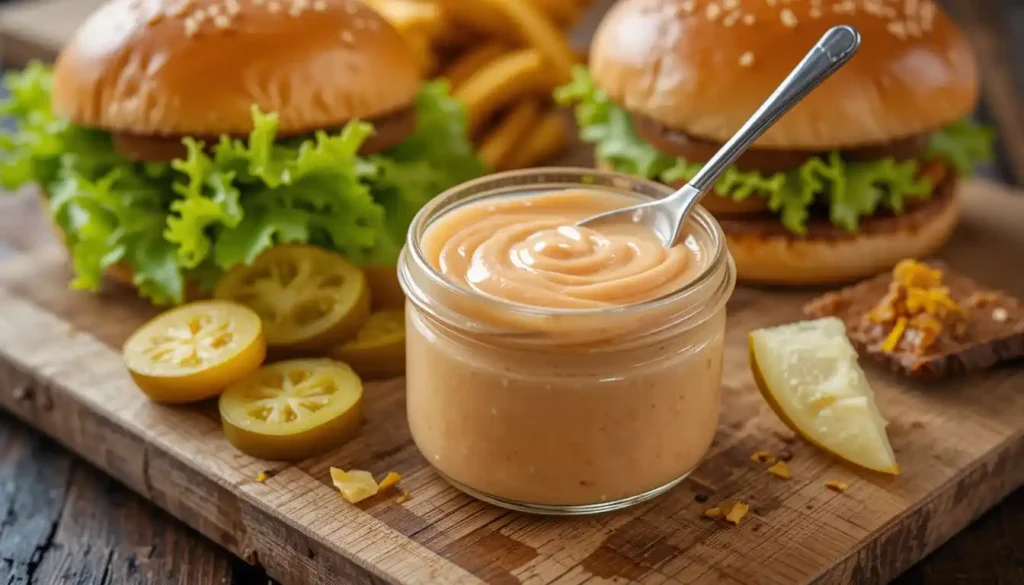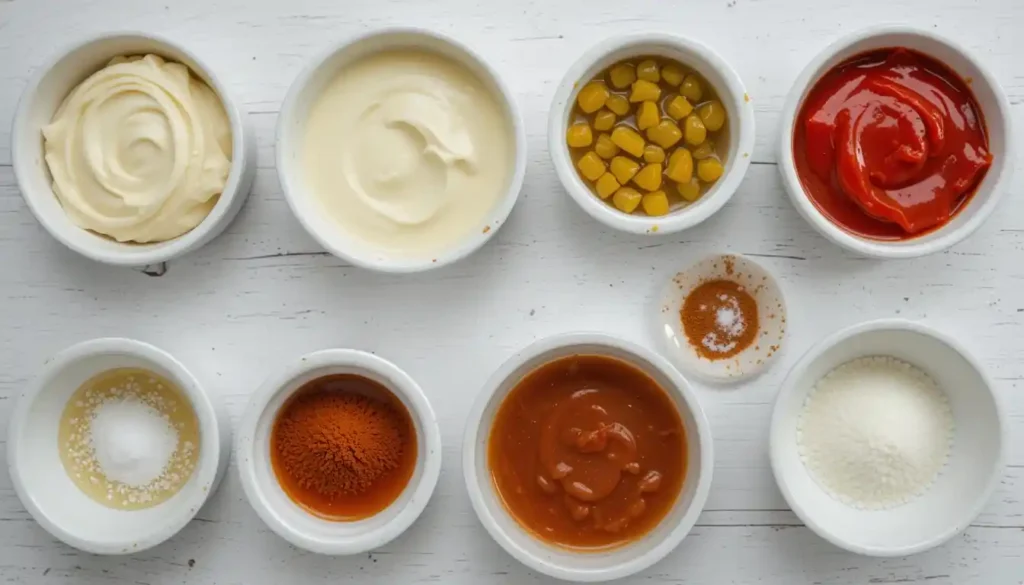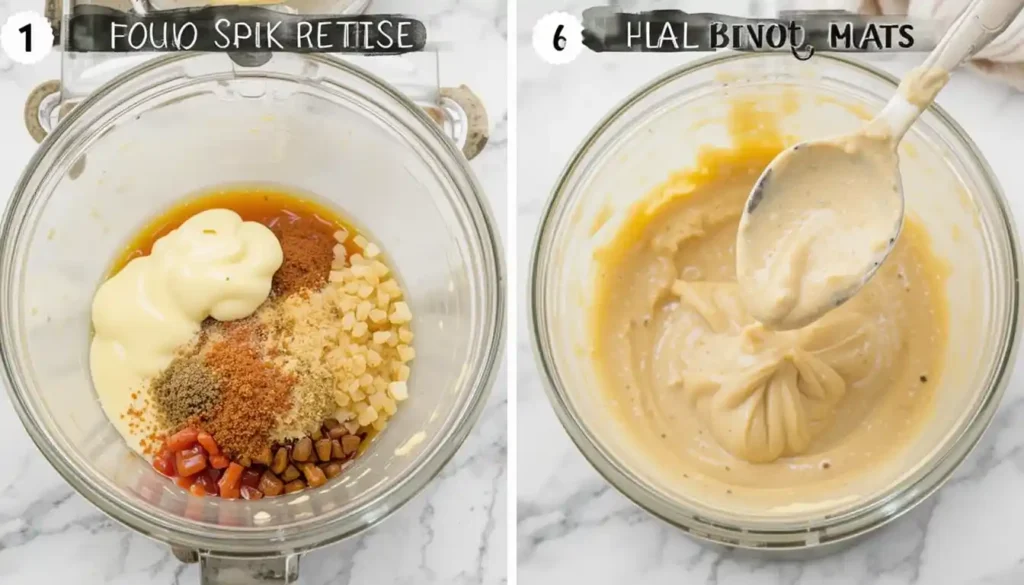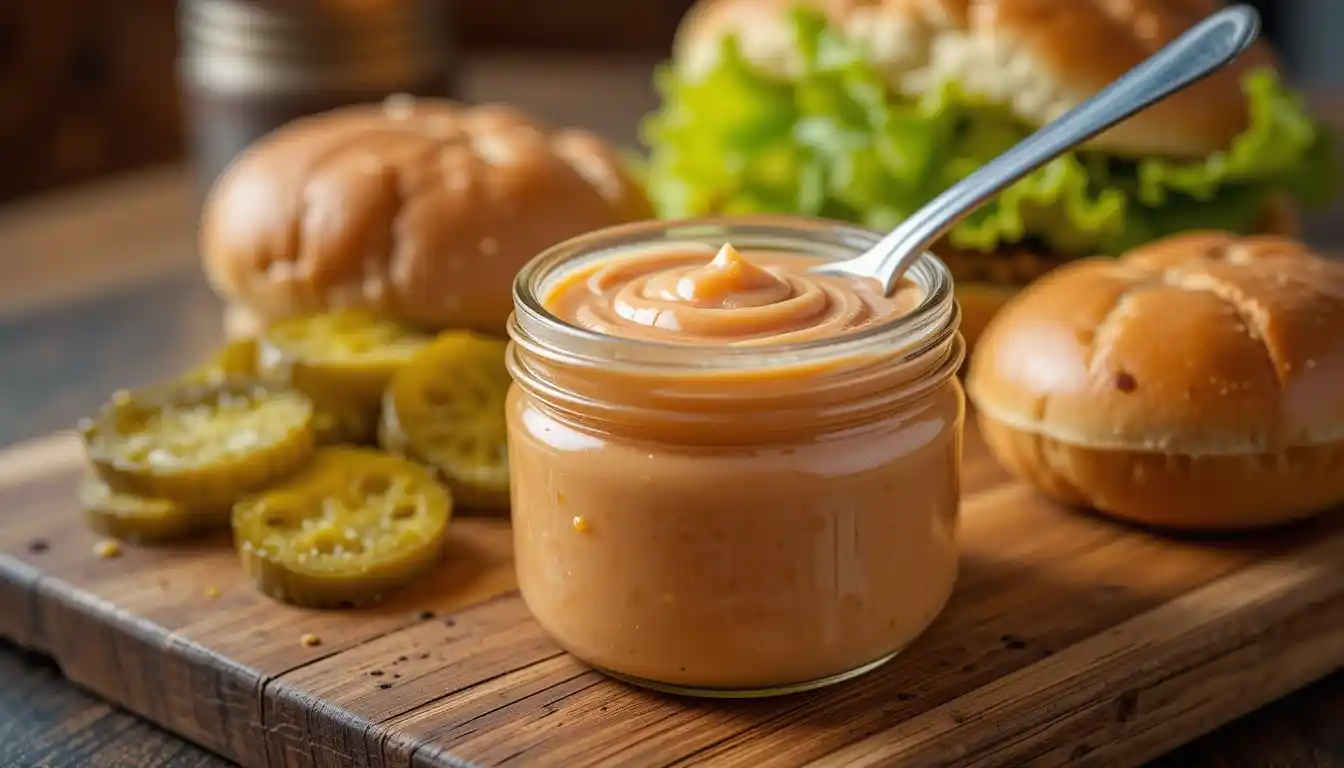Table of Contents
“The discovery of a new dish does more for human happiness than the discovery of a new star.” – Jean Anthelme Brillat-Savarin. This quote resonates deeply when it comes to elevating a classic like the burger to new heights. One simple yet effective way to do this is by adding a rich and tangy burger sauce.
Making your own homemade burger sauce is surprisingly easy and requires just a few common pantry ingredients. Not only does it taste better than store-bought alternatives, but it’s also incredibly versatile – perfect for dipping fries, topping sandwiches, or adding a burst of flavor to your favorite dishes.

As you explore this article, you’ll learn how to create the perfect condiment to take your meals to the next level. You’ll discover the simplicity of the recipe and how to customize it to your taste.
What Makes a Great Burger Sauce
A great burger sauce is the secret ingredient that elevates your burger from ordinary to extraordinary. It’s the crowning glory that brings together the flavors of the patty, toppings, and bun, creating a harmonious and delicious experience.
The Secret to Restaurant-Quality Burgers
High-end restaurants and burger joints often have a signature sauce that sets them apart from the competition. This signature flavor is typically achieved by striking a perfect balance between sweet, tangy, and savory notes, creating a truly memorable taste experience.
Store-Bought vs. Homemade Comparison
When comparing store-bought burger sauces to homemade versions, several key differences emerge. Store-bought sauces often contain preservatives and lack the freshness of homemade alternatives. In contrast, homemade burger sauce allows you to customize the flavor to your liking, using fresh ingredients that result in a superior taste experience.
By making your own burger sauce at home, you can avoid the preservatives found in many commercial products and enjoy a more cost-effective solution. Additionally, homemade sauce can be tailored to your personal preferences, ensuring that your burgers are always served with the perfect condiment.
- A well-crafted burger sauce brings balance and harmony to the flavors of your burger.
- Homemade sauce allows for customization and avoids preservatives found in store-bought options.
- Fresh ingredients contribute to a superior flavor profile in homemade burger sauce.
Essential Ingredients for the Perfect Burger Sauce Recipe
Crafting the perfect burger sauce starts with understanding its essential ingredients. The right combination of elements will elevate your burgers to the next level.

Base Ingredients: Mayo, Ketchup, and Mustard
The base of your burger sauce is crucial. Mayonnaise provides a creamy texture, while ketchup adds sweetness and a tangy tomato flavor. Mustard, whether yellow or Dijon, contributes a pungent flavor that complements the beef.
Flavor Enhancers: Relish, Vinegar, and Seasonings
To enhance the flavor, ingredients like sweet pickle relish add a tangy, crunchy texture. Vinegar helps balance the flavors and thins out the consistency. Seasonings such as garlic powder, onion powder, and black pepper add depth to the sauce.
Optional Add-ins for Customization
For a personalized touch, consider adding Worcestershire sauce for umami, hot sauce for spice, or smoked paprika for a smoky flavor. These optional ingredients allow you to tailor the sauce to your taste preferences.
Step-by-Step Burger Sauce Recipe
Making your own burger sauce at home is easier than you think and requires minimal ingredients. To start, you’ll need to gather your ingredients and understand the simple process of combining them.

Measuring and Combining Ingredients
To make the base recipe, you’ll need to whisk together 1/2 cup mayonnaise, 1/4 cup ketchup, 2 tablespoons yellow mustard, 1 tablespoon finely chopped onion, 1 teaspoon garlic powder, and 1 tablespoon white vinegar in a bowl. It’s essential to use a whisk to properly emulsify the sauce ingredients.
Adjusting Flavors to Your Taste
After combining the base ingredients, taste the sauce and adjust the seasoning as needed. You can add hot sauce for an extra kick or seasoned pepper to enhance the flavor. The key is to achieve a balance that suits your taste preferences.
| Ingredient | Quantity |
|---|---|
| Mayonnaise | 1/2 cup |
| Ketchup | 1/4 cup |
| Yellow Mustard | 2 tablespoons |
| Finely Chopped Onion | 1 tablespoon |
| Garlic Powder | 1 teaspoon |
| White Vinegar | 1 tablespoon |
Once you’ve adjusted the flavors, cover the bowl and refrigerate the sauce for at least 1 hour to allow the flavors to meld together. This step is crucial for developing the full flavor potential of your burger sauce recipe.
Classic Burger Sauce Variations
Unlock the full potential of your burgers by experimenting with different burger sauce flavors. You can easily transform the classic recipe into various mouth-watering variations.
Spicy Burger Sauce
Add a kick to your burger with a spicy version. Introduce heat with hot sauce, cayenne pepper, or chipotle powder. Start with a small amount and adjust to taste.
Sweet and Tangy Option
Balance the flavors with a sweet and tangy variation. Increase the sugar or honey content and balance it with additional vinegar for a unique twist.
Thousand Island-Style Variation
Create a Thousand Island-style sauce similar to famous fast-food special sauces. Adjust the relish and sweetness levels to achieve the desired flavor.
Here’s a comparison of the different variations:
| Variation | Key Ingredients | Flavor Profile |
|---|---|---|
| Spicy | Hot sauce, cayenne pepper, chipotle powder | Spicy, bold |
| Sweet and Tangy | Sugar, honey, vinegar | Balanced, sweet, tangy |
| Thousand Island-Style | Relish, sweetness adjusters | Rich, creamy, tangy |
When customizing your sauce, incrementally adjust the ingredients to avoid ruining the batch. Each variation pairs differently with various burger styles and toppings, so feel free to experiment and find your perfect match.
How to Store Your Homemade Burger Sauce
Proper storage is key to maintaining the flavor and freshness of your homemade burger sauce. To achieve this, you need to select the right container and follow proper refrigeration techniques.
Proper Container Selection
Using an airtight container is crucial for preserving the freshness of your homemade burger sauce and preventing it from absorbing odors from other foods in the fridge. Recommended containers include glass jars and squeeze bottles.
Shelf Life and Refrigeration Tips
Your homemade burger sauce can last for 3-5 days when stored properly in the refrigerator. It’s essential to label the container with the preparation date to track its freshness. Generally, it’s not recommended to freeze burger sauce as it may affect its texture and flavor.
| Storage Method | Shelf Life | Notes |
|---|---|---|
| Refrigeration in airtight container | 3-5 days | Keep in fridge at consistent temperature |
| Freezing | Not recommended | May affect texture and flavor |
By following these storage tips, you can enjoy your homemade burger sauce for a longer period while maintaining its quality.
Perfect Pairings: What to Serve with Your Burger Sauce
Your homemade burger sauce is just the beginning – here are some perfect pairing ideas. This versatile sauce can elevate a variety of dishes beyond just burgers.
Classic Burger Applications
For a classic burger, pair your sauce with cheddar cheese, lettuce, tomato, and a toasted brioche bun. Apply the sauce directly to the bottom bun for an even distribution of flavor. You can also customize your burger with different protein options like chicken or turkey.
Beyond Burgers: Other Foods That Benefit
Use your burger sauce as a dip for fries or onion rings for a tasty snack. It also works well as a spread for sandwiches and wraps. Try incorporating it into cold salads like potato salad or coleslaw for added flavor. For breakfast items, use it as a topping for breakfast sandwiches or hash browns.
- Pair with fries or onion rings for a delicious dip.
- Use as a spread for sandwiches and wraps.
- Add to cold salads for extra flavor.
- Top breakfast items like breakfast sandwiches or hash browns.
Nutritional Information and Dietary Considerations
Understanding the nutritional content of your homemade burger sauce is crucial for making informed dietary choices. With a few simple modifications, you can enjoy your favorite condiment while managing your nutritional intake.
Calorie and Macronutrient Breakdown
A cup of homemade burger sauce contains approximately 879kcal, with 84g of fat, 29g of carbohydrates, and 2g of protein. The high fat content is primarily due to the mayonnaise. Being mindful of portion sizes can help manage caloric intake.
Dietary Modifications and Substitutions
To make the sauce vegan or lower in calories, consider substituting mayonnaise with plant-based alternatives. Reducing sugar and salt content is also possible by adjusting the amount of ketchup and relish used. These modifications can affect the overall taste and texture, so some experimentation may be necessary.
Pro Tips for Burger Sauce Success
Mastering burger sauce is all about understanding the nuances of flavor and consistency. To create a truly exceptional burger sauce, you need to balance these elements effectively.
Achieving the Perfect Consistency
The ideal consistency is crucial for a great burger sauce. You can achieve this by using the right ingredient ratios and adjusting according to temperature changes. For instance, refrigerating the sauce can thicken it, while room temperature can thin it out.
Balancing Flavors Like a Chef
Balancing flavors involves understanding the principles of sweet, salty, acidic, and umami. By adding ingredients in a specific order and allowing the sauce to rest, you can develop complex flavors over time. This resting period is crucial for the flavors to meld together.
Common Mistakes to Avoid When Making Burger Sauce
To ensure your homemade burger sauce tastes great, it’s crucial to steer clear of some common errors. Making a great burger sauce is not just about mixing ingredients together; it’s about achieving a balance of flavors and the right consistency.
Ingredient Ratio Errors
One of the most common mistakes is getting the ingredient ratios wrong. Using too much of one ingredient can throw off the balance of the sauce. For example, too much mayo can make the sauce overly rich and thick, while too little ketchup can result in a lack of sweetness.
Preparation and Storage Mistakes
Preparation and storage mistakes can also significantly impact the quality of your burger sauce. Not mixing the ingredients thoroughly can lead to an inconsistent texture, while storing the sauce in an improper container can affect its flavor and freshness.
When making burger sauce, using fresh, high-quality ingredients is crucial. Avoid using expired condiments, as they can negatively impact the flavor. Also, be mindful of how you store your sauce – using an airtight container and keeping it in the fridge will help maintain its quality.
Some common mistakes to watch out for include over-relying on one ingredient, not mixing the sauce sufficiently, storing it improperly, and not allowing enough time for the flavors to meld before serving.
| Mistake | Impact | Solution |
|---|---|---|
| Incorrect ingredient ratios | Unbalanced flavor | Adjust ratios according to taste |
| Insufficient mixing | Inconsistent texture | Mix thoroughly until smooth |
| Improper storage | Flavor and freshness loss | Store in airtight container in fridge |
| Using low-quality ingredients | Poor flavor | Use fresh, high-quality ingredients |
Creative Uses for Leftover Burger Sauce
Leftover burger sauce is a treasure trove of culinary possibilities waiting to be explored. You can breathe new life into various dishes with this versatile condiment.
As a Dip for Appetizers and Sides
Transform your snack game by using burger sauce as a dip. It’s perfect for appetizers like mozzarella sticks, jalapeño poppers, or a fresh vegetable platter. You can also elevate your sides by turning ordinary french fries, sweet potato fries, or onion rings into gourmet treats.
In Other Sandwich and Wrap Recipes
Beyond burgers, your homemade sauce can enhance other sandwich recipes. Try it in club sandwiches or BLTs for an added layer of flavor. It’s also a great spread for wraps and pitas filled with chicken, turkey, or veggies.
| Use | Description |
|---|---|
| Dip for Fries | Elevate your fries with a side of burger sauce |
| Sandwich Spread | Add flavor to club sandwiches and wraps |
| Salad Dressing | Thin out the sauce for a unique salad dressing |
You can also incorporate the sauce into cold salads like macaroni salad or potato salad for an extra kick. For a different twist, thin the sauce slightly to create a unique salad dressing. Additionally, it can serve as a marinade base for grilled chicken or other proteins. Don’t forget about breakfast applications – add it to breakfast sandwiches or use it as a dipping sauce for hash browns.
Why This Burger Sauce Beats Fast Food Versions
Homemade burger sauce stands out from fast food versions due to its freshness, quality ingredients, and adaptability to personal taste. You can elevate your burger game with a sauce that’s not only delicious but also made with your preferences in mind.
Quality Ingredient Advantage
When you make burger sauce at home, you have the advantage of choosing high-quality ingredients. Unlike fast food chains that often rely on preservatives and artificial additives, your homemade sauce can be made with fresh mayo, ketchup, and spices, ensuring a better taste and healthier profile.
Customization Benefits
Another significant benefit of homemade burger sauce is the ability to customize it according to your taste preferences. You can adjust the level of spiciness, sweetness, or tanginess to suit your palate, something that’s not possible with the standardized sauces used by fast food chains. This flexibility makes your burger experience even more enjoyable.
Conclusion
The secret to a restaurant-quality burger lies in its sauce, and making it at home is easier than you think. By following this burger sauce recipe, you can enjoy superior flavor, customization options, and cost-effectiveness. Experiment with variations to find your perfect sauce, and don’t forget to store it properly to maintain quality. Make this sauce a staple in your cooking repertoire and elevate your burgers to the next level.
FAQ
How long can I store homemade burger sauce in the fridge?
You can store your homemade condiment in an airtight container in the refrigerator for up to two weeks. Make sure to check the shelf life of individual ingredients used in the sauce.
Can I customize the flavor of my homemade condiment?
Yes, you can adjust the flavor to your taste by adding or substituting different condiments, such as hot sauce or dill pickle relish, and seasonings.
Is it possible to make a low-fat version of the sauce?
Yes, you can create a lower-fat version by using reduced-fat or fat-free mayonnaise and being mindful of other high-fat ingredients.
Can I use this sauce as a dip for fries or other sides?
Absolutely, this versatile condiment is great as a dip for fries, onion rings, or veggies.
How do I achieve the perfect consistency for my sauce?
You can adjust the consistency by adding more or less of the liquid ingredients, such as vinegar or ketchup, until you reach your desired thickness.
Can I make this sauce in advance for a party or gathering?
Yes, you can prepare the sauce ahead of time and store it in the fridge until you’re ready to serve.
What are some other uses for leftover sauce?
You can use leftover condiment as a topping for grilled meats or as an ingredient in other sandwich and wrap recipes.

